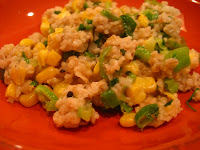Iced Capp? Iced Coffee? Frappuccino? Iced Mocha? No matter what your choice, it still spells one thing....loads of calories and most of them from fat!
So, how can you enjoy your favourite gourmet drinks without all the empty calories? I have a couple recipes today to help you enjoy those ‘treat” drinks. These will taste so good that you’ll swear they aren't good for you but they are! The protein powder not only curbs hunger pangs but adds that metabolically active ingredient...PROTEIN!
I have a couple different ones I use, they are both quite flexible in terms of milk that you use, but once you try them you can work out what suits your taste buds or time frame best. Play around with them to develop the taste you enjoy, without the calories!
If you just want to wet the whistle, try pouring cold coffee over ice! Add a little sweetener if you must but I like it straight up!
-sugar-free non-fat vanilla yogurt
-non-fat milk (or almond milk, rice milk or soy milk – vanilla flavoured, if you prefer)
-instant coffee crystals
-vanilla or chocolate whey protein powder
-cinammon
Directions: You’ll start by spooning sugar-free, nonfat vanilla yogurt in an ice cube tray and freezing it into cubes overnight. Then you’ll add them to a blender with a splash of milk, a teaspoon of instant coffee crystals, and a scoop of vanilla or chocolate whey protein powder. Lastly, just sprinkle on some cinnamon to add a little fat-burning kick. If you want to cut down on the caffeine, just use decaffeinated instant coffee instead.
Quick Iced Mocha or Vanilla Coffee
-ice cubes
-1 cup non-fat milk, almond milk, soy or rice milk (can use vanilla flavoured milk for more of that vanilla flavour)
-instant coffee crystals or 1 c strong cold leftover coffee (I make extra to use for iced coffee!)
-1 scoop chocolate whey protein powder (for mocha) or vanilla
-cinammon and/or stevia (sweetener) to taste
Directions: Throw all the ingredients in a blender or good shaker cup and give it a good shake or until you see it has thickened. Pour into a tall glass and sip away! Easy to prepare and no chore to drink (about 200 cal and 25g Protein).
So, how can you enjoy your favourite gourmet drinks without all the empty calories? I have a couple recipes today to help you enjoy those ‘treat” drinks. These will taste so good that you’ll swear they aren't good for you but they are! The protein powder not only curbs hunger pangs but adds that metabolically active ingredient...PROTEIN!
I have a couple different ones I use, they are both quite flexible in terms of milk that you use, but once you try them you can work out what suits your taste buds or time frame best. Play around with them to develop the taste you enjoy, without the calories!
If you just want to wet the whistle, try pouring cold coffee over ice! Add a little sweetener if you must but I like it straight up!
Vanilla Iced Coffee
-sugar-free non-fat vanilla yogurt
-non-fat milk (or almond milk, rice milk or soy milk – vanilla flavoured, if you prefer)
-instant coffee crystals
-vanilla or chocolate whey protein powder
-cinammon
Directions: You’ll start by spooning sugar-free, nonfat vanilla yogurt in an ice cube tray and freezing it into cubes overnight. Then you’ll add them to a blender with a splash of milk, a teaspoon of instant coffee crystals, and a scoop of vanilla or chocolate whey protein powder. Lastly, just sprinkle on some cinnamon to add a little fat-burning kick. If you want to cut down on the caffeine, just use decaffeinated instant coffee instead.
Quick Iced Mocha or Vanilla Coffee
-ice cubes
-1 cup non-fat milk, almond milk, soy or rice milk (can use vanilla flavoured milk for more of that vanilla flavour)
-instant coffee crystals or 1 c strong cold leftover coffee (I make extra to use for iced coffee!)
-1 scoop chocolate whey protein powder (for mocha) or vanilla
-cinammon and/or stevia (sweetener) to taste
Directions: Throw all the ingredients in a blender or good shaker cup and give it a good shake or until you see it has thickened. Pour into a tall glass and sip away! Easy to prepare and no chore to drink (about 200 cal and 25g Protein).
